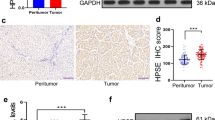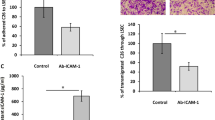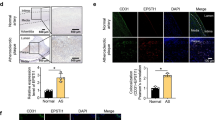Abstract
Adhesion of cancer cells to vascular endothelium is an important step in haematogenous metastasis of cancer. A human hepatocellular carcinoma cell line, HepG2, strongly adheres to human umbilical vein endothelial cells (HUVECs) through the interaction of E-selectin and its carbohydrate ligand sialyl Lewis X. In this study, we investigated alteration in integrin expression on HepG2 cells, which follows the selectin-mediated initial adhesion of HepG2 cells to HUVECs. Expression of alpha2beta1 integrin was markedly increased when the HepG2 cells adhered to HUVECs. Among the tested cytokines that are known to be produced by endothelial cells, recombinant hepatocyte growth factor (rHGF) could replace the effect of HUVECs, and a similar increase in integrin expression was observed by the addition of 20 ng ml-1 rHGF to HepG2. The increment of alpha2beta1 integrin expression was significantly inhibited by anti-HGF neutralizing antibody treatment. HepG2 cells expressed alpha2, alpha6, beta1, and beta4 integrin subunits, but expression of integrins other than alpha2beta1 was not affected by the rHGF treatment. The rHGF treatment of HepG2 cells resulted in augmented adhesion to immobilized collagen. This augmentation in adhesion to collagen was completely blocked by the addition of anti-alpha2- or anti-beta1-integrin antibody. In double-chamber chemoinvasion experiments, transmigration of the HepG2 cells through extracellular matrix (ECM) gel was significantly accelerated by co-cultivation with HUVECs. A similar level of enhancement in transmigration activity of the cancer cells was observed by the addition of rHGF. Our interpretation of the results described above is that the cancer cells received stimulation from cytokines, such as HGF, presented by vascular endothelial cells, following the initial adhesion of cancer cells via selectins. This resulted in the secondary increment in the expression of cell adhesion molecules, such as the alpha2beta1 integrin, and led to the augmented adhesive activities of cancer cells towards extracellular matrices at vascular walls. We suggest that this sequence of events is involved in the facilitated migration of some cancer cells to extravascular tissues.
This is a preview of subscription content, access via your institution
Access options
Subscribe to this journal
Receive 24 print issues and online access
$259.00 per year
only $10.79 per issue
Buy this article
- Purchase on Springer Link
- Instant access to full article PDF
Prices may be subject to local taxes which are calculated during checkout
Similar content being viewed by others
Author information
Authors and Affiliations
Rights and permissions
About this article
Cite this article
Kawakami-Kimura, N., Narita, T., Ohmori, K. et al. Involvement of hepatocyte growth factor in increased integrin expression on HepG2 cells triggered by adhesion to endothelial cells. Br J Cancer 75, 47–53 (1997). https://doi.org/10.1038/bjc.1997.8
Issue Date:
DOI: https://doi.org/10.1038/bjc.1997.8
This article is cited by
-
Investigation of the invasion mechanism mediated by the outer membrane protein PagN of Salmonella Typhimurium
BMC Microbiology (2021)
-
Angiocrine endothelium: from physiology to cancer
Journal of Translational Medicine (2020)
-
Quantified forces between HepG2 hepatocarcinoma and WA07 pluripotent stem cells with natural biomaterials correlate with in vitro cell behavior
Scientific Reports (2019)
-
Crossing the endothelial barrier during metastasis
Nature Reviews Cancer (2013)
-
DNAzymes to mouse β1 integrin mRNA in vivo: targeting the tumor vasculature and retarding cancer growth
Cancer Gene Therapy (2009)



